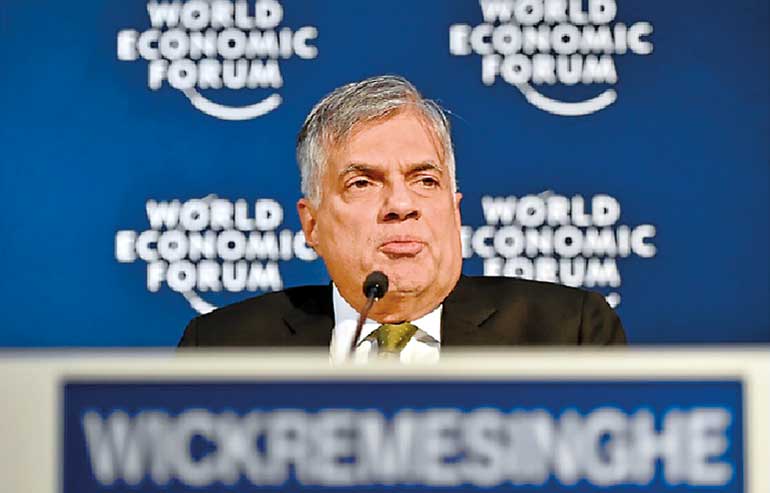Tuesday Feb 24, 2026
Tuesday Feb 24, 2026
Monday, 15 February 2016 00:00 - - {{hitsCtrl.values.hits}}
 Prime Minister Ranil Wickremesinghe
Prime Minister Ranil Wickremesinghe
Despite facing an “uncertain year,” Prime Minister Ranil Wickremesinghe speaking to journalists present to cover the World Economic Forum in Davos told them that attracting foreign investment will be a key focus of the new Government.
Addressing the international media at a press conference at the WEF Media Village in Davos, Premier Wickremesinghe also expressed confidence that Sri Lanka will manage several of its macro-economic challenges such as fiscal consolidation.
He also said that a support program from the International Monetary Fund (IMF) is likely and the mega Chinese project the $ 1.4 billion Colombo Port City would be continued.
“Since the Budget the world has changed and that is why we are having discussions with the IMF. Fiscal consolidation will be part of the Budget. We will have to relook at our figures as we go as this will be a very uncertain year but gradually we would like to see more and more private investment coming in over a period of time,” he told reporters.
Wickremesinghe confirmed the Government was having discussions with the IMF, but had not concluded discussions. During his visit to Davos, the Premier met with IMF Managing Director Christine Lagarde.
The Prime Minister noted attention was being paid to restructuring the economy to increase foreign earnings and reduce the balance of payments.
“There has certainly been a drop in revenue collection, the mechanism is not working. We are also being buffeted by what is happening internationally; certainly the global economy has not recovered fast enough and then it has been compounded by China deciding to become a consumption-oriented economy. We did have the Sri Lanka Economic Forum where we discussed fully some of the issues that have been discussed with the private sector and once I talk to the IMF we will look at contingency plans for the future,” he said.
“No one is sure how events will turn out in 2016. Secondly we want to be strong enough to face any contingency and carry out our restructuring. It is not surprising that everyone is adjusting their targets and budgets and if appropriate we will come to an agreement with the IMF,” he added.
Acknowledging China was one of the biggest economic powers in the world Wickremesinghe went onto say within Sri Lanka there were a large number of infrastructure projects being funded by the Chinese Government.
“We are going ahead with many of those projects, including the Port City and further development of the Hambantota Harbour, but we have also said we would like to see Chinese investment as infrastructure alone is not sufficient. Now we are talking of investments and I think the Chinese Government has also decided manufacturing industries should move out and Sri Lanka seems to be one of the locations their industries should move out to. We are looking at Chinese participation in the logistics hub as well as more investment in the real estate sector.”
Premier Wickremesinghe also made a short statement recapping the gains made by Sri Lanka in 2015.
“This is a unique occasion for Sri Lanka when we have formed a Government of the two main parties. This has never happened in South Asia or Southeast Asia. We have started off on a great experiment. Firstly, of reconciliation, of bringing the country together after people were torn apart during a 30-year war, and restabilising a constitutional democracy and also having a framework agreement to deal with economic and social problems. Even after we part company, there will be a national policy in place and whoever governs will not change it. So these are the challenges we are facing.”
Responding to questions on reconciliation, Wickremesinghe recalled measures to reach out to Tamil communities and reconciliation mechanisms under the Foreign Affairs Ministry.
“We are having discussions with the Tamil parties on the new Constitution, on the election system, which affects all the parties on devolution and handed back land from the military. Tamils are being recruited into the Police force; gradually things are getting back on track. We have no political prisoners anymore in the country whether they are Sinhalese or Tamils. There are 290 people, some of whom have already been convicted, while others are on trial. This is the residue after a large number of them were released. As it is we are looking at some of these cases to see what relief can be given.”